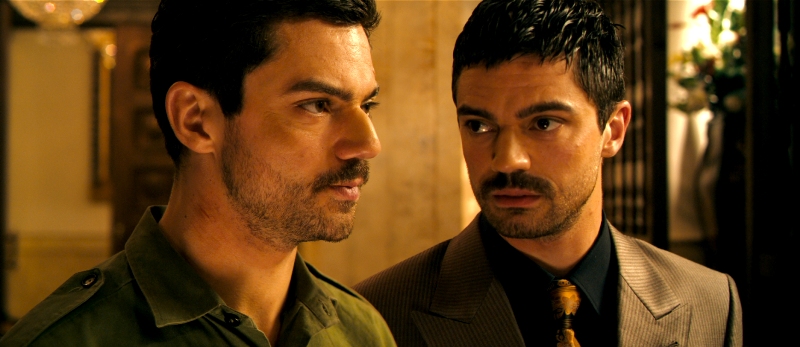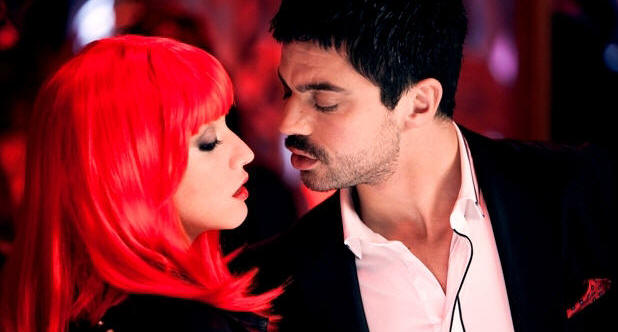MOVIE REVIEWS |
INTERVIEWS |
YOUTUBE |
NEWS
|
EDITORIALS | EVENTS |
AUDIO |
ESSAYS |
ARCHIVES |
CONTACT
|
PHOTOS |
COMING SOON|
EXAMINER.COM FILM ARTICLES
||HOME

Friday, August 5, 2011
MOVIE REVIEW
The Devil's Double
Like Bloody Father, Like Vicious Son, Like "Son"

Dominic Cooper (left) as Latif Yahia and Dominic Cooper as Uday Hussein in Lee
Tamahori's "The Devil's Double.
Lionsgate
by
Omar P.L. Moore/PopcornReel.com
 FOLLOW
FOLLOW
Friday,
August 5, 2011
Set in 1987 and spanning ten years, Lee Tamahori's drama "The Devil's Double" is
a comic-book cartoon showcase of Uday Hussein, a sadist and megalomaniac who
terrified the Iraqi populace and posed a threat to the stability of his father
Saddam Hussein's tyrannical regime. The film is based on the life story of
Latif Yahia, forced to be the body double of Mr. Hussein's eldest son.
"The Devil's Double" screenplay is written by Mr. Yahia and Michael Thomas.
The film opened last week in New York City and Los Angeles, and expanded today
in additional U.S. cities.
Dominic Cooper ("An
Education",
"Tamara Drewe", "Captain America") is
mesmerizing as Uday Hussein in a theatrical, over-the-top performance. Mr.
Cooper chews the scenery, which is lurid and opulent, marked by savagery and
blood. Mr. Cooper, unfailingly entertaining here in a performance akin to
the show-stopping end-of-the-world style of one Tony Montana, also adeptly
portrays Uday's doppelganger Latif, a cautious, put-upon man. (You needn't
look too closely to notice the visual effects when Mr. Cooper is on screen as
both characters at once, yet the effect remains arresting. Comparatively,
the visual subtlety of Armie Hammer's
"Social Network" duality was seamless.)
The psychology at play in "The Devil's Double" is that of two unlikely brothers;
one vying to be anonymous yet extravagant, the other looking to escape the skin
he's unwittingly locked in. Mr. Cooper plays this Cain and Abel act well,
with parody lurking at the outer edges of his flashy display. On a knife's
edge, Mr. Cooper's comedy and drama masks are exemplified in textbook fashion.
Uday and Latif are dueling identities in an angel-or-devil fight. At times
this duel is pure theater, sometimes great, other times exhausted. In any
case, Mr. Cooper's work here is the sole reason to invest in a film that is
otherwise remarkably empty.
Ludivine Sagnier ("Swimming Pool") is Sarrab, Uday's girlfriend.
Sarrab takes a
liking to Latif, complicating the relationship between the two men. Ms.
Sagnier, in a sly, kittenish come-hither performance, dons wigs, looking
alternately like Bettie Page and Jessica Rabbit, among others. For all her
materialistic decoration and allegiance to Uday, Sarrab is a moll, but a muted,
aching one. Only later does Ms. Sagnier come to life beyond the stylist
trappings of her character, though her belated emergence is brought on by plot
necessities. The film's casting at the top isn't curious as much as it is
expedient. As I watched I wondered whether other actors (Cliff Curtis,
Benjamin Bratt,
Sarita Choudhury, Summer Bishil, Freida Pinto, who was great in
Julian Schnabel's
"Miral") couldn't have done what Mr. Cooper and Ms. Sagnier do here.
Mr. Tamahori ("Die Another Day") captures the menace of Uday Hussein's
sociopathic ways and graphic violence but keeps the bloodletting and decor
stylized, making the film less serious than it should be. We never see
beyond the repetitive horrors that aren't for the squeamish, so we're deadened
by their monotony. Though hewing closely to Uday's vile behaviors, "The
Devil's Double" is bubble-gum eye-candy that occasionally titillates, and comes
close to romanticizing its main object.
The film is a wicked comedy about a vainglorious, narcissistic ugly duckling
undisciplined in his father's brutal ways of business rather than about a
supposed rational man who reluctantly inhabits him. Mr. Cooper is at his
best when his Latif internally wrestles. In sum, "The Devil's Double"
caricaturizes violence more than it glorifies it, and there may be a very fine
line between those two methods.
Every major character in the film yearns for an escape. Sarrab can't deal
with the intensity of her situation. Uday wants to be less a son and just
take the mantle his father has. (The film has its Oedipal leanings and
drag-queen playhouse.) Latif just wants to get out of Iraq. Maybe
The Animals' song
"We've Gotta Get Out Of This Place" would
describe his sentiments, as well as Sarrab's.
Mr. Tamahori largely avoids chronicling the relationship between the eldest
Hussein son and his father, one rife with tension. Qusay Hussein, barely
shown here, was Saddam Hussein's favored son. (Both Qusay and Uday were
killed in a raid by U.S. Special Armed Forces in July 2003.)

Ludivine Sagnier as Sarrab and
Dominic Cooper as Uday Hussein in Lee Tamahori's "The Devil's Double.
Lionsgate
With its rich decadence and alluring design "The Devil's Double" is a
voyeuristic indulgence: we see flashes of the good, much of the bad and copious
doses of the ugly, shown in a tantalizing way, dripped in its own guilty
pleasures and the self-idolatry of its devilish lead figure. Even though
Uday Hussein was a real-life madman there's little perspective in much of what
we see in Mr. Tamahori's film. The flamboyant flourishes and physical
aspects of Mr. Cooper's performance stay surface, never evolving or deepening.
Since the film looks a lot like the bright, vivid slickness of "Dick Tracy" it's
hard to take seriously. Rather than being haunted and unsettled by Mr.
Tamahori's film -- effects and feelings that Mr. Cooper's solid work merit -- I
was numbed by its violence and exhausted by its flashes of artsy "torture-porn".
The subject matter and film itself are robbed of the power they deserve.
As if preemptively realizing this, Mr. Tamahori inserts news media footage of
the real Saddam Hussein, President George H.W. Bush, U.S. General Norman
Schwartzkopf in the late 1980s and early 1990s throughout in an attempt to give
a serious tenor and contrast to the colorful scenery we're immersed in.
The footage feels like a forced yet half-hearted attempt to ground the film in
its proper tone and political context. The documentary feel and its pace
don't work in a film that aligns itself firmly and totally in camp and high
gloss.
Generally "The Devil's Double" is unsure of its identity. Is it a biopic,
a fantasy, a fetish, a political drama, a parody, a sex comedy or a horror
movie? Maybe it's all of those, but the opening credits purport a biopic.
When "based on the life story of Latif Yahia" flashes on the screen in bright
yellow lettering, that's more or less what I expected to see in movie
approximation. The film isn't an "inspired by" story but that's what it
looks like. We don't see or sense a biopic; the film doesn't have the
appreciable scope or range. "The Devil's Double" essentially glimpses
Latif Yahia living with, and "as", Uday Hussein. The rest of Mr. Yahia's
life isn't so much as dessert in the film until a coda in its end credits
explains some of those details.
Granted, films take dramatic license all the time, but "The Devil's Double"
exists as a carnival of stolen moments of propaganda from news broadcasts,
splashed as outtakes of some of the very personal videos Uday Hussein kept
hundreds of.
Admittedly the subject matter, real-life events and their function in a film of
this nature present a tough challenge for any director. Mr. Tamahori must
execute a story that some know about and even more have forgotten and still even
more have no idea of. He has to make the story and its events entertaining
without trivializing or making them showy or irrelevant. The director has
Mr. Cooper as his most personable and talented asset but he himself doesn't
marshal those performances and adequately connect them to the time and place
they exist in. The film could have happened at any time, but Mr. Tamahori
tries to fix it in time with the news footage. The atmosphere of the film
feels false. Narration, and a more focused approach may have worked better
in "The Devil's Double", which overall lacked the voice of the Latif character
it needed much more of.
With: Philip Quast, Raad Rawi,
Nasser Memarzia, Mark Mifsud, Jamie Harding, Mem Ferda, Dar Salim, Khalid Laith,
Pano Masti, Selva Rasalingham, Akin Gazi.
"The Devil's Double" is rated R by the Motion Picture
Association Of America for strong brutal bloody violence and torture, sexual content,
graphic nudity, drug use and pervasive language. The film's
running time is one hour and 48 minutes.
COPYRIGHT 2011. POPCORNREEL.COM. ALL RIGHTS RESERVED.  FOLLOW
FOLLOW
SUBSCRIBE TO THE POPCORN REEL MOVIE
REVIEWS RSS FEED

MOVIE REVIEWS |
INTERVIEWS |
YOUTUBE |
NEWS
|
EDITORIALS | EVENTS |
AUDIO |
ESSAYS |
ARCHIVES |
CONTACT
| PHOTOS |
COMING SOON|
EXAMINER.COM FILM ARTICLES
||HOME

 FOLLOW
TWEET
FOLLOW
TWEET
 FOLLOW
FOLLOW